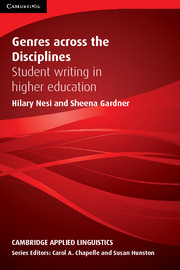Book contents
- Frontmatter
- Contents
- Series editors’ preface
- Abbreviations
- Acknowledgements
- Part I Investigating Student Writing: From Corpus to Genre Family
- 1 Investigating student writing with the BAWE corpus
- 2 Families of genres of assessed writing
- Part II Social Functions of University Student Writing
- 3 Demonstrating knowledge and understanding
- 4 Developing powers of informed and independent reasoning
- 5 Developing research skills
- 6 Preparing for professional practice
- 7 Writing for oneself and others
- 8 Networks across genres and disciplines
- Appendices
- Index
1 - Investigating student writing with the BAWE corpus
Published online by Cambridge University Press: 07 January 2021
- Frontmatter
- Contents
- Series editors’ preface
- Abbreviations
- Acknowledgements
- Part I Investigating Student Writing: From Corpus to Genre Family
- 1 Investigating student writing with the BAWE corpus
- 2 Families of genres of assessed writing
- Part II Social Functions of University Student Writing
- 3 Demonstrating knowledge and understanding
- 4 Developing powers of informed and independent reasoning
- 5 Developing research skills
- 6 Preparing for professional practice
- 7 Writing for oneself and others
- 8 Networks across genres and disciplines
- Appendices
- Index
Summary
The book draws on the findings of a four-year study to investigate genres of student writing in higher education. It provides an overview of the kind of writing British university students produce, showing the similarities and differences between writing assignments at different levels and across a range of disciplines. This information will be useful to researchers analysing the discourse of academic writing, to academics concerned with developing writing tasks at university level and to teachers who provide academic writing support to students, whether this is within the context of English for Academic Purposes (EAP) or in writing centres which largely cater for native speakers of English.
The book proposes a system of describing and distinguishing between different types of tertiary-level writing task. We identify and describe thirteen major types of assignment, each of which has a unique purpose and structure, but which is also subject to some variation in response to disciplinary requirements. Readers who devise academic writing tasks can use our descriptions of these assignment types as templates or as a stimulus for thought about the purpose and structure of the writing they expect their students to produce. Our descriptions may help them to distinguish between the different requirements of different writing tasks, and may also help them to make these distinctions clear to their students. Additionally, the descriptions can serve as a reference for writing teachers who are guiding their students towards more appropriate stylistic and organisational choices. The book describes the discourse features of successful assignments in terms of their underlying communicative purpose; successful assignments are those which achieve the intended purpose of the writing task, with due acknowledgement of disciplinary norms and expectations.
The Educational Context of University Student Writing
This book is written at a time of massive expansion in higher education. According to UNESCO (2008) about 138 million students were enrolled in tertiary education in 2005, an increase of 45 million university students worldwide since 1999. This rise has been partly due to population growth, and partly due to widening participation policies. Some countries have made great efforts to attract into higher education young people who have been academically disadvantaged, and to this end have encouraged universities to accept students without traditional university entry qualifications. In some countries a state university place is now guaranteed to all young people who have successfully completed secondary school.
- Type
- Chapter
- Information
- Genres across the DisciplinesStudent Writing in Higher Education, pp. 2 - 20Publisher: Cambridge University PressPrint publication year: 2012



